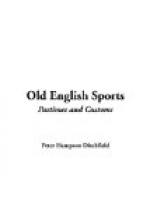“The holly hitherto
did sway;
Let
box now domineere,
Untill the dancing
Easter-day,
Or
Easter’s eve appeare.”
Hunting—Candlemas Day—St. Blaize’s
Day—Shrove-tide—
Football—Battledore and Shuttlecock—Cock-throwing.
The fox-hounds often meet in our village during this cheerless month, and I am reminded by the red coats of the huntsmen, and by the sound of the cheerful horn, of the sportsmen of ancient days, who chased the wolf, hart, wild boar, and buck among these same woods and dales of England. All hearts love to hear the merry sound of the huntsman’s horn, except perhaps that of the hunted fox or stag. The love of hunting seems ingrained in every Englishman, and whenever the horsemen appear in sight, or the “music” of the hounds is heard in the distance, the spade is laid aside, the ploughman leaves his team, the coachman his stables, the gardener his greenhouses, books are closed, and every one rushes away to see the sport. The squire, the farmers, and every one who by hook or by crook can procure a mount, join in the merry chase, for as an old poet sings—
“The hunt is up,
the hunt is up,
Sing merrily we,
the hunt is up;
The birds they
sing,
The deer they
fling:
Hey, nony, nony-no:
The hounds they
cry,
The hunters they
fly,
Hey trolilo, trolilo,
The hunt is up.”
We English folks come of a very sporting family. The ancient Britons were expert hunters, and lived chiefly on the prey which they killed. Our Saxon forefathers loved the chase, and in some very old Saxon pictures illustrating the occupations of each month we see the lord, attended by his huntsmen, chasing the wild boars in the woods and forests. The Saxon king, Edgar, imposed a tribute of wolves’ heads, and Athelstan ordered the payment of fines in hawks and strong-scented dogs. Edward the Confessor, too, who scorned worldly amusements, used to take “delight in following a pack of swift dogs, and in cheering them with his voice.” The illustration is taken from an old illumination which adorned an ancient Ms., and represents some Saxons engaged in unearthing a fox.
[Illustration: Hunting in Saxon times (from an ancient Ms.).]
When the Normans came to England great changes were made, and hunting—the favourite sport of the Conqueror—was promoted with a total disregard of the welfare of the people. Whole villages and churches were pulled down in order to enlarge the royal forests, and any one who was rash enough to kill the king’s deer would lose his life or his eyesight. It was not until the reign of Henry iii. that this law was altered. William the Conqueror, who forbade the killing of deer and of boars, and who “loved the tall stags as though he were their father,” greatly enlarged the New Forest, in Hampshire. Henry I. built




